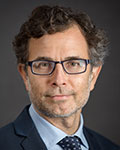
Federico Augustovski, MD, MSc, PhD, is the current director of Health Economic Evaluations and Technology Assessment at the Institute for Clinical Effectiveness and Health Policy (IECS), an independent non-profit organization affiliated to the University of Buenos Aires, a CONICET (National Scientific and Technical Research Council) center, and one of the few INAHTA Health Technology Assessments agencies in Latin America. Federico is the director of the WHO Collaborating Centre in Health Technology Assessment and Economic Evaluations at IECS. He is also the founding editor-in-chief for Latin America section of Value in Health Regional Issues, the ISPOR peer-reviewed journal for Latin America, Asia, and Central & Eastern Europe, Western Asia, and Africa. He is the director of the PAHO affiliated PROVAC Center of Excellence for decision making in vaccines. Federico leads a multidisciplinary team devoted to clinical and economic evaluations of new and existing preventive, diagnostic, and therapeutic technologies that provides research, education, and technical support with public and private health decision makers in Latin America. He is a professor of Public Health at the School of Public Health of the University of Buenos Aires, where he teaches courses for graduate and postgraduate students in Decision Sciences; Patient-Reported Outcomes Development in Health, as well as Health Economic Evaluations.
Federico earned his MD with honors at the University of Buenos Aires and is a specialist in family medicine. He practiced family medicine and was a staff physician for more than 20 years at the Family and Community Medicine Division of the Hospital Italiano de Buenos Aires. He received his MSc in epidemiology (Harvard School of Public Health). He was a European Union Scholar in health economics at the Centre for Health Economics at the University of York in the UK. His research production concentrates in health technology assessments and health economic evaluations methods and applications. He has published more than 70 PubMed-indexed papers.
Federico has served and serves ISPOR in several capacities during the past 10 years. Among other commitments, he was the first Latin American director on the board of directors, the founder and first president of the Argentine local chapter, the first chair of the Latin American Consortium, chair of the Research Excellence Award, president of Buenos Aires 2013 Regional meeting, member of the Health Science and Policy Council and Vision 2020 teams, as well as several Task Forces.
ISPOR Vision Statement by Federico Augustovski, MD, MSc, PhD
ISPOR was launched in 1995 with 240 health professionals mostly from the United States. Nowadays, we are an established and thriving organization: In these two decades, we grew both wider (now with members from 114 countries all over the world) and larger (around 80 times larger, totaling more than 18,000 ISPOR and regional chapter members). As health economics and outcomes research grew, ISPOR launched the Asian and then the Latin American consortium about a decade ago.
When Adrian Towse, chair of the Nominations Committee offered me this nomination, it took me a while to realize that he was being serious, as there has never been a president before that did not come from the North American/European “core.” I am now convinced that it is a good idea at this stage. I am a professional trained in the North (Harvard School of Public Health, and Centre for Health Economics at the University of York) that has always worked in the South (mainly Latin America).
I got to know this organization rather well in my 10 years as a member: among others, I was director of the Board, the first president of the Latin American consortium, a member of Vision 2020 team, and the co-editor in chief of our recently MEDLINE-indexed journal, Value in Health Regional Issues.
It would be a great honor for me to serve as your president. I would push to help our society to successfully achieve the ISPOR 2020 Vision “to be recognized globally as the authority for outcomes research and its use in health care decisions,” and concentrate more efforts on the following areas:
- Making ISPOR wider and broader. To make it wider, ISPOR needs to increase its prominence outside Europe and the United States. I will promote this by supporting our regional chapters our regional consortia. To make it broader, we need to attract currently underrepresented stakeholder groups, such as patients and government/private decision makers (an issue where US and Europe can learn from the Asian and Latin American successful experiences);
- Making ISPOR deeper, continuing to improve the science of outcomes research through our task forces and journals;
- Making ISPOR more open by promoting collaboration with global and regional organizations that share our values; and, last but not least;
- Making ISPOR more enjoyable, as in order to keep building better science and challenging our priors; having a friendly and stimulating environment, and spending good time building memories are other key ingredients for our success.
